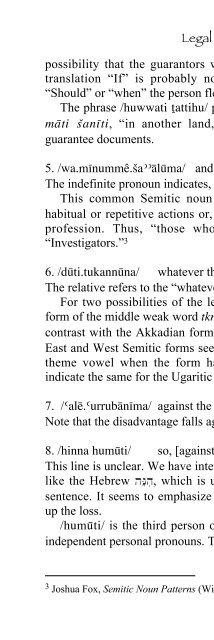A Primer on Ugaritic: Language, Culture, and Literature - enenuru
A Primer on Ugaritic: Language, Culture, and Literature - enenuru
A Primer on Ugaritic: Language, Culture, and Literature - enenuru
You also want an ePaper? Increase the reach of your titles
YUMPU automatically turns print PDFs into web optimized ePapers that Google loves.
Legal Texts 101<br />
possibility that the guarantors will be left paying the bill. The<br />
translati<strong>on</strong> “If” is probably not str<strong>on</strong>g enough for this text.<br />
“Should” or “when” the pers<strong>on</strong> flees, the insurers will pay in full.<br />
The phrase /huwwati tattihu/ parallels the Akkadian phrase ina<br />
maœti sûanˆäti, “in another l<strong>and</strong>,” found in syllabic cuneiform<br />
guarantee documents.<br />
5. /wa.mˆänumme®.sûa}}aœluœma/ <strong>and</strong> all the investigators<br />
The indefinite pr<strong>on</strong>oun indicates, “whatever, everything, all.”<br />
This comm<strong>on</strong> Semitic noun pattern, C1vC2C2aœC3-, signifies<br />
habitual or repetitive acti<strong>on</strong>s or, as a substantive, a member of a<br />
professi<strong>on</strong>. Thus, “those who ask regularly,” or, perhaps,<br />
“Investigators.” 3<br />
6. /duœti.tukannuœna/ whatever they might establish<br />
The relative refers to the “whatever” the investigators find.<br />
For two possibilities of the length of the theme vowel in this<br />
form of the middle weak word tknn, see the Hebrew D form N´nwøky in<br />
c<strong>on</strong>trast with the Akkadian formulati<strong>on</strong> ukannuœ. Since both these<br />
East <strong>and</strong> West Semitic forms seem to use a double C3 <strong>and</strong> a short<br />
theme vowel when the form has an ending, we have tried to<br />
indicate the same for the <strong>Ugaritic</strong> verb. This form appears energic.<br />
7. /{aleœ.{urrubaœnˆäma/ against the guarantors<br />
Note that the disadvantage falls against the co-signers.<br />
8. /hinna humuœti/ so, [against] them<br />
This line is unclear. We have interpreted this as the deictic particle,<br />
like the Hebrew h…´nIh, which is used to point something out in a<br />
sentence. It seems to emphasize the pers<strong>on</strong>s resp<strong>on</strong>sible to make<br />
up the loss.<br />
/humuœti/ isthe third pers<strong>on</strong> oblique (i.e., genitive-accusative)<br />
independent pers<strong>on</strong>al pr<strong>on</strong>ouns. The antecedent is /{urrubaœnˆäma/.<br />
3 Joshua Fox, Semitic Noun Patterns (Win<strong>on</strong>a Lake, 2003), 253.


